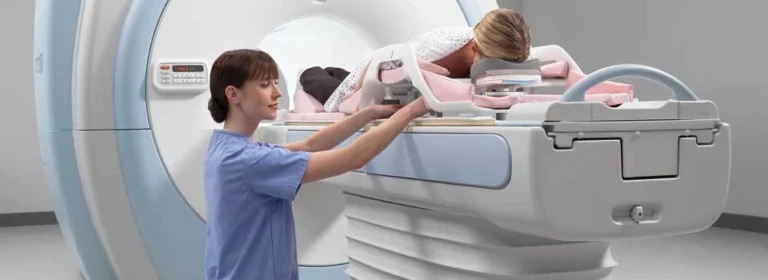Breast MRI is a powerful technique used for primary detection of breast cancer in high-risk patients and for determination of the extent of disease after it has been diagnosed using mammography or ultrasound. MRI is a non-invasive procedure that uses a magnetic field and radio waves to create digital images of your breast. Breast MRI is an extremely sensitive method of disease detection, although it is not a replacement for mammography or ultrasound imaging but rather a supplemental tool that is useful in many different clinical situations.
Breast MRI may be recommended for:
• Screening in patients with a strong family history of breast cancer.
• Preoperative evaluation following recent diagnosis of breast cancer.
• Further evaluation of inconclusive mammography or ultrasound.
• Suspected leak or rupture of a silicone breast implant.
• Follow up after chemotherapy treatment.
You should wear comfortable loose-fitting clothing, though you may be asked to change into a patient gown. Any metal-containing objects such as earrings, eyeglasses, or hairpins should be removed. You should avoid drinking coffee or other caffeinated beverages prior to scanning so you are able to lie still for the duration of the exam.
You will not be able to have an MRI examination if you have any of the following:
• Most pacemakers
• Certain brain aneurysm clips
• Cochlear implants
• Metallic fragments in an eye
• Implanted spinal cord stimulator
• Certain other metal-containing implants
A gadolinium-based contrast agent will be injected into a vein in your hand or arm to improve visualization of breast abnormalities on the MRI images. Please let us know if:
• You are pregnant or think you might be
• You are breastfeeding
• You have anemia or any diseases that affect red blood cells
• You have asthma or other allergic respiratory disorders
• You have kidney (renal) disease
• You have a history of injury during military service
• You have a history of working with metal
After you arrive for your appointment, you will be escorted to a procedure room, where you will be asked to change into a patient gown. A nurse or technologist will then insert an intravenous line (IV) into a vein in your hand or arm for injection of the contrast agent. You will lie face down on a moveable exam table, and your breasts will be positioned into special openings in the table. After you have been properly positioned, the technologist will begin obtaining the MRI images.
The MRI machine creates a magnetic field around you and directs radio waves at your body to create the MRI images. You won’t feel the magnetic field or radio waves, but you may hear loud tapping and thumping sounds coming from inside the machine. While the images are obtained, you will be instructed to breathe normally but to lie as still as possible. The technologist will monitor you from another room. You will be able to speak to the technologist through a microphone, and the technologist will also be able to talk to you. The entire procedure may take up to one hour.
For your safety and the protection of others, we do not allow anyone other than patients in our exam rooms.
If you have been diagnosed with breast cancer, your physician may recommend a breast MRI to understand the following:
• The size of the cancer and whether it is spreading to surrounding tissue
• If there are other cancers present in the same breast or in the opposite breast
• Assess the lymph nodes to determine if the cancer has spread in that area
• If a mammogram or ultrasound shows an unclear result, a breast MRI can provide a much clearer picture and determine if further studies are needed.
After your study, the images will be evaluated by one of our board-certified radiologists with expertise in breast imaging. A final report will be sent to your doctor or healthcare provider, who can then discuss the results with you in detail.
Reports are also available on the Patient Portal


